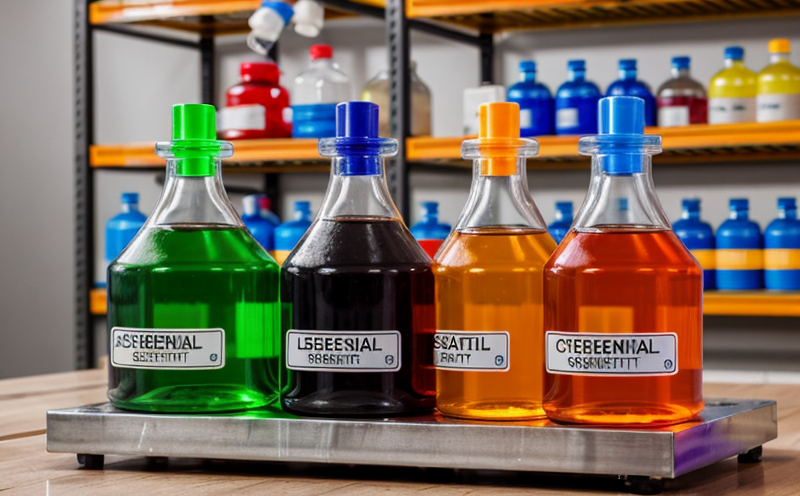Residual Pesticide Testing in Organic Products
In recent years, consumer demand for organic products has surged, driven by a growing preference for natural and chemical-free alternatives. This trend reflects not only the health-conscious consumer mindset but also the increasing awareness of environmental sustainability and food safety. As a result, ensuring that organic products are free from harmful residues is critical to maintaining consumer trust and market competitiveness.
Residual pesticide testing in organic products involves identifying trace amounts of pesticides that may remain on or within these items despite efforts during cultivation, processing, and storage. The primary goal is to guarantee compliance with international standards such as ISO 17025 and ASTM E3468-21, which outline the requirements for proficiency in laboratory testing.
Our specialized team utilizes advanced analytical techniques like Gas Chromatography-Mass Spectrometry (GCMS) and Liquid Chromatography-Tandem Mass Spectrometry (LC-MS/MS) to detect even trace amounts of pesticides. This precision is essential given the stringent limits imposed by regulatory bodies such as the European Union's Maximum Residue Levels (MRLs).
The process begins with meticulous sample preparation, which involves careful selection and homogenization of representative samples from production batches or individual units. The chosen methods are designed to minimize contamination while ensuring accurate results.
Post-sample preparation, the next step is instrumental analysis. Our state-of-the-art laboratories employ sophisticated equipment capable of distinguishing between harmless naturally occurring compounds and potentially harmful synthetic pesticides. This differentiation ensures that only true residues are detected and reported.
The analytical data obtained from these tests forms the basis for our comprehensive reports. These documents provide detailed breakdowns of any detected pesticide residues, their concentrations, and comparisons against relevant standards. The results serve as critical inputs for quality assurance teams and regulatory compliance officers responsible for maintaining product integrity.
Our services extend beyond mere detection; we also offer expert advice on best practices to prevent contamination during cultivation, processing, and packaging stages. This proactive approach helps our clients stay ahead of emerging challenges in the organic sector and enhances their reputation among consumers.
By partnering with us for residual pesticide testing, your organization can demonstrate commitment to quality and safety, thereby fostering long-term relationships with customers who value these qualities highly. In an era where trust plays a pivotal role in brand success, reliable third-party verification offers invaluable reassurance to both producers and purchasers.
Customer Impact and Satisfaction
Ensuring that organic products are free from harmful pesticides not only meets regulatory requirements but also significantly enhances customer satisfaction. Consumers who purchase organic goods often do so because they believe these items are safer and more environmentally friendly compared to conventional alternatives.
Avoiding pesticide residues reassures customers about the purity of their food, which is particularly important for families with young children or individuals with sensitivities to chemicals. This assurance translates directly into higher customer loyalty and repeat purchases, contributing positively to your brand image.
In addition to enhancing consumer trust, eliminating pesticides from organic products also supports broader business objectives related to corporate social responsibility (CSR). Demonstrating commitment to reducing environmental impact aligns well with increasingly prevalent sustainability initiatives across industries. It positions you as a leader in ethical sourcing and production practices.
For quality managers and compliance officers, our services provide peace of mind regarding regulatory adherence. By providing accurate and reliable test results, we help ensure that your products meet all applicable standards, thereby reducing the risk of non-compliance penalties or recalls.
Environmental and Sustainability Contributions
Residual pesticide testing plays a crucial role in promoting environmental sustainability within the organic sector. By ensuring that no harmful residues are present in organic products, we contribute to preserving natural ecosystems and biodiversity.
Pesticides used on conventional crops can leach into soil and groundwater, leading to pollution of aquatic habitats and harm to wildlife species. Eliminating these contaminants from organic products helps mitigate this issue by preventing their entry into the broader ecosystem through proper disposal or handling practices.
Additionally, reducing pesticide use supports sustainable agricultural practices that enhance soil health and promote beneficial insects like pollinators. This shift towards more environmentally friendly methods benefits both landowners and future generations by fostering resilient farming systems capable of adapting to changing climatic conditions.
The organic certification process itself encourages farmers to adopt integrated pest management strategies which focus on prevention rather than chemical intervention. Through our testing services, we support this transition by helping producers identify potential risks early on so they can implement corrective measures promptly.
Competitive Advantage and Market Impact
In today’s competitive market landscape, offering organic products free from harmful pesticides is a key differentiator that sets you apart from competitors. Consumers are willing to pay premium prices for organic goods perceived as safer and healthier options compared to conventional alternatives.
By leveraging our residual pesticide testing services, you can confidently claim compliance with strict regulatory standards like the European Union's MRLs or US Department of Agriculture (USDA) Organic Standards. Such claims carry significant weight in marketing campaigns aimed at health-conscious consumers seeking assurance about product safety.
Achieving and maintaining organic certification requires ongoing vigilance regarding contamination risks. Our expert analysis provides valuable insights into areas where improvements might be necessary, helping you stay ahead of potential issues before they arise. This proactive approach not only strengthens your position in existing markets but also opens up opportunities for expansion into new regions with growing organic sectors.





